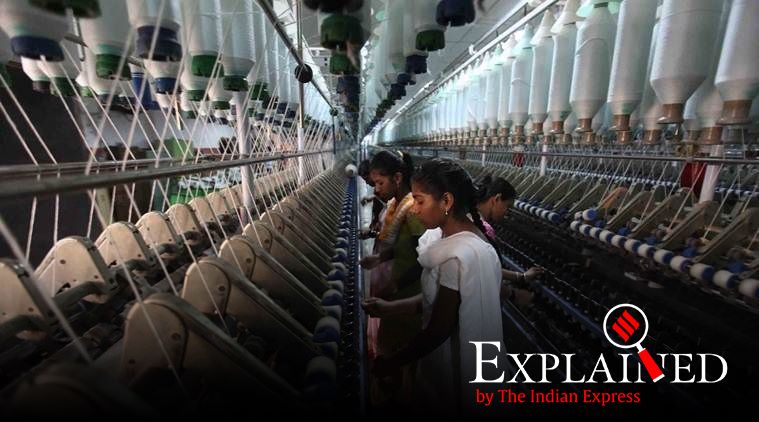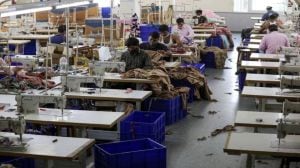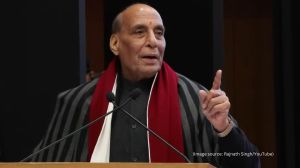Explained: Gujarat’s Aatmanirbhar small loans scheme for the self-employed
The scheme will begin on May 21, and the lending agencies will accept applications until August 31. The banks and credit societies have been asked to finish all disbursements by November 15, 2020.
 According to an illustrative list, rickshaw drivers, tractor repairers, plumbers, electricians, masons, fabricators, housemaids, dhobis, handcart owners, pastiwalas, painters, tea kiosk owners, sweetshop owners, cooks, tailors, cobblers, etc. can apply for a loan.(File)
According to an illustrative list, rickshaw drivers, tractor repairers, plumbers, electricians, masons, fabricators, housemaids, dhobis, handcart owners, pastiwalas, painters, tea kiosk owners, sweetshop owners, cooks, tailors, cobblers, etc. can apply for a loan.(File)
Gujarat Chief Minister Vijay Rupani has announced a “Aatmanirbhar Gujarat Sahay Yojana” that offers a loan of up to Rs 1 lakh for a period of three years to small entrepreneurs and self-employed workers such as electricians, plumbers, and carpenters.
The scheme also aims to cover domestic helps, vegetable vendors, construction workers, and others who have lost their incomes in the Covid-19 lockdown.
Applicants to the scheme will need guarantors to help push their case before credit societies and urban and district cooperative banks that will hand out Rs 5,000 crore worth of collateral-free loans. They will also need to be aware of the penalties in case of a default.
Read| India Coronavirus numbers explained: Why there has been a spike in new cases and recoveries
How will the Aatmanirbhar Gujarat Sahay Yojana work?
A total 260 urban cooperative banks, 18 district cooperative banks, and 6,500 credit cooperative societies registered under the Gujarat Cooperative Act will provide collateral-free loans at an interest rate of 2 per cent to successful applicants.
The state government will bear the cost of an additional 6 per cent interest on the “unsecured loans”, which will have a moratorium of six months during which the applicant will not have to pay either the interest or the principal amount.
The loans will, however, need to be paid back in equal instalments over the following 30 months.
Any self employed person or entrepreneur can apply.
“The scheme is applicable to any conceivable business, provided the person falls under the category of a small trader, shopkeeper or self employed workmen. It is meant to arm them with working capital after their business was stalled for two or three months,” Manish Bhardwaj, Secretary, Animal Husbandry, Fisheries and Cooperation, said.
Read| Full break-up of all five tranches announced by FM Nirmala Sitharaman
According to an illustrative list, rickshaw drivers, tractor repairers, plumbers, electricians, masons, fabricators, housemaids, dhobis, handcart owners, pastiwalas, painters, tea kiosk owners, sweetshop owners, cooks, tailors, cobblers, etc. can apply for a loan.
When will the scheme be rolled out?
The scheme will begin on May 21, and the lending agencies will accept applications until August 31. The banks and credit societies have been asked to finish all disbursements by November 15, 2020.
The disbursements of the loans have been left to the banks, which can accept or reject an application depending on the repayment capabilities of the applicant.
“The banks have been given full freedom to decide on the applications. Suppose two barbers apply. One has a small shop and the other has a bigger one. The banks can give a loan of Rs 25,000 to one and Rs 1 lakh to the other, depending on their assessment of each person’s capacity to repay,” Bharadwaj said. The scheme also applies to those who have branded franchises.
What details and documents must an applicant supply?
The application form asks for the “purpose of loan”, apart from family income and monthly expenses, and details of existing loans. Applicants have to also provide “two guarantors” along with the details of their incomes.
Along with the application form, an affidavit, an acceptance letter of having taken a loan, a demand promissory note, and a loan agreement needs to be submitted.
Other documents needed include a letter from the concerned association regarding self-employment (for instance, if a barber seeks a loan, then a letter from the local association of barbers will be considered valid), documents to prove that the applicant was self-employed as on January 1, 2020, copy of the Aadhaar of the applicant and all members of his/her family, copy of PAN or Form-60, and copy of ration card.
Lockdown 4.0: List of states that have extended lockdown
No property needs to be mortgaged to avail the loan. However, the banks will make their assessment, and fill in the applicant’s KYC (Know Your Customer) details.
According to officials, housemaids or cleaners can attach a letter of reference from their employers. A carpenter or a barber can get a letter from the local association, which will help the banks make an assessment of the applicant.
What if an applicant has a pending loan in the same/any other bank?
Officials say the existence of a continuing loan will not be a disqualification as long as the applicant is not a defaulter. The conditions listed for the loan state the applicant should “not have an overdue loan in this bank or any other banks”.
What happens if the applicant fails to repay the loan under this scheme?
The loan becomes an NPA in case of default in repayment. The applicant must submit an affidavit agreeing to pay 8 per cent interest on the outstanding balance immediately if any detail in the application is found to be incorrect. The bank will have the right to take legal action against the applicant, at the cost of the applicant or the guarantor.
The applicant has to submit five cheques as “loan security”. The applicant will enjoy the discounted interest rate (of 6 per cent) only if regular EMIs are paid.
A “penalty interest” of 3 per cent will be charged if the applicant is unable to return the loan amount. This interest will be charged from the date of default. In such a case, the bank will continue to own any instrument or equipment bought with the loaned sum.
How will the government keep a tab on repayments?
A state-level monitoring committee headed by Additional Chief Secretary, Finance, will conduct a periodic review of the scheme, and will keep a watch on the performance of each bank which is part of the scheme. It will also keep a tab on NPAs.
Does the applicant need to be a member of a credit society? Is there a cap on lending beyond Rs 5,000 crore?
Currently, cooperative banks have been mandated to extend loans up to 10 per cent of their total assets. “The state government is in the process of sending a proposal to the Reserve Bank of India (RBI) through the Union Finance Ministry to allow banks the freedom to lend up to 20 per cent of their total assets. That will increase the kitty available with banks,” Bhardwaj said.
“Also, cooperative banks and societies can lend money only to their members. All applicants will not be members, so we are asking them to be made nominal members. Applicants will be made nominal members (who do not have voting rights) free of cost. But the urban and cooperative banks cannot have more than 20 per cent nominal members. So we are writing to the Government of India to extend this cap of nominal members to 40 per cent for this year, so that more number of people get benefitted,” the official said.
How much will the Gujarat government pay to the lending agencies during the three-year period?
Apart from the 2 per cent interest that an applicant pays on the loan, the Gujarat government will reimburse the 6 per cent interest on a quarterly basis (generally it is done annually) to the lending agencies. The government estimates the payout to the lending agencies to be over Rs 400 crore during this three-year period.
The state government will also give a one-time, 2 per cent (of the loans extended) incentive to the banks and societies for extending the loan, doing the paperwork and due diligence as per RBI norms, and regular follow-ups.


- 01
- 02
- 03
- 04
- 05




































